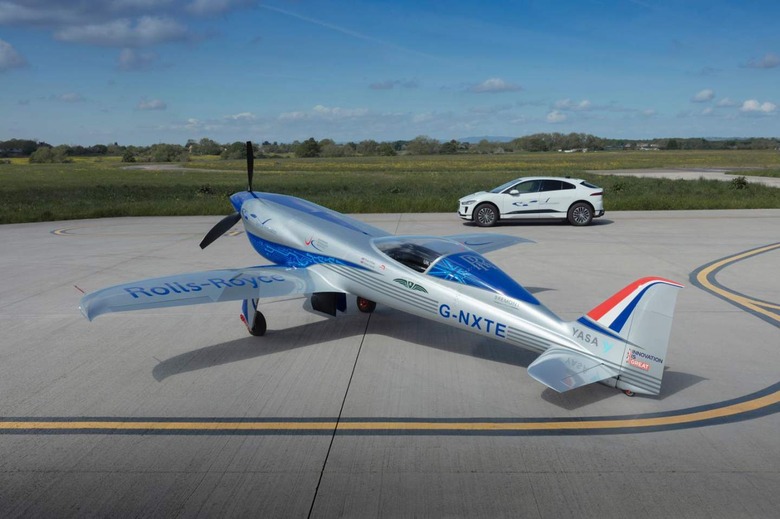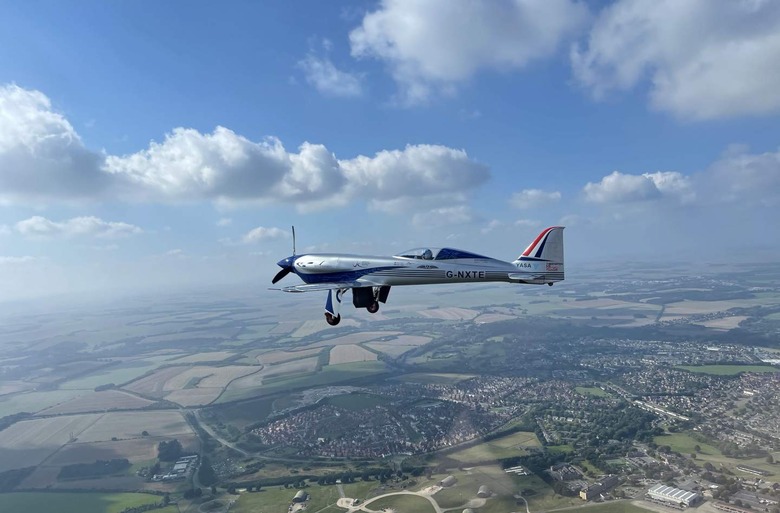Rolls-Royce Spirit Of Innovation Is The Fastest Electric Vehicle Ever
We say the name Rolls-Royce, we usually think of incredibly luxurious cars that cost more than many homes. However, Rolls-Royce isn't only in the automotive business. The company has a very long and rich history of building engines for aircraft. Rolls-Royce engines were key to the war effort during World War II and beyond.Rolls-Royce is talking up a new all-electric vehicle called the Spirit of Innovation. It's an aircraft driven by a propeller that has laid claim to the title of world's fastest all-electric aircraft by grabbing new world records. Data has been submitted to Fédération Aéronautique Internationale (FAI), the World Air Sports Federation controlling and certifying aeronautical and astronomical records. The data submitted showed that the Spirit of Innovation reached a top speed of 345.4 mph over a course spanning three kilometers.
The Rolls-Royce aircraft is vastly faster than the previous record-holder, which had a measured top speed of 132 mph. Rolls-Royce conducted test flights with the all-electric aircraft over a significantly longer 15-kilometer course, achieving an average speed of 330 mph, a whopping 182 mph faster than the previous record holder.
Spirit of Innovation also captured another important aviation record with the fastest climb to 3000 meters, taking a total of 202 seconds. Rolls-Royce broke the previous record for the fastest climb to 3000 meters by 60 seconds. While the data has been submitted to FAI, the agency has yet to officially certify the times as world records, but Rolls-Royce expects that to happen soon.
While attempting to break the record, the fastest speed recorded for the aircraft was 387.4 mph making Spirit of Innovation the fastest all-electric vehicle in history. The aircraft was designed to be highly aerodynamic and is quite small, holding only the pilot. It's powered by a 400kW electric powertrain producing over 500 horsepower.
That monster electric motor is powered by what Rolls-Royce calls the most power-dense propulsion battery pack ever assembled for aerospace use. To build the impressive battery pack, Rolls-Royce worked with a battery specialist in the aviation industry called Electroflight and a powertrain supplier in the automotive industry called YASA.

While attempting to set world records is interesting, Rolls-Royce is clear that data gathered from this experimental aircraft is critical for developing future electric power and propulsion systems used in emissions-free commuter aircraft. Those aircraft will be used in the future to provide urban air mobility and produce hybrid-electric commuter planes. Spirit of Innovation shares some of the characteristics electric air taxis demand in their batteries.
The aircraft Rolls-Royce is attempting to take the record for fastest electric aircraft from comes from Siemens. The previous record-holder was an Extra 330 LE aerobatic aircraft powered by a Siemens eAircraft engine. Spirit of Innovation is part of the ACCEL (Accelerating the Electrification of Flight) project. Half of the funding for the aircraft came from the Aerospace Technology Institute, which was in partnership with the Department for Business, Energy & Industrial Strategy and Innovate UK. Two other major British companies also support the program, including Jaguar Land Rover and luxury watchmaker Bremont. Jaguar Land Rover provided the team with electric I-PACE vehicles used as towing and support vehicles for the aircraft team. Bremont acted as the official timing partner for the record-setting attempts.

Emissions-free aviation is critical to helping reduce pollution all around the world. When we think of green vehicles, we often only think of cars and trucks driving highways and other roadways worldwide. However, a significant portion of the pollution we are fighting comes from aircraft, particularly major commercial airliners that crisscross the planet daily.
Green aviation will be huge in the future, and global delivery company DHL ordered 12 all-electric aircraft over the summer. One of the biggest manufacturers of commercial aircraft in the world is Airbus, and it revealed an all-electric aircraft prototype back in 2015. Earlier this month, another emissions-free all-electric aircraft was revealed called the Wright Spirit. That aircraft can carry 100 passengers and expects to make its maiden flight in 2026.
The ability to carry 100 passengers would make it appropriate for some short-haul routes. Battery technology that's currently available won't allow transcontinental or longer regional flights to happen. However, the company behind the Wright Spirit believes the aircraft can significantly reduce global emissions by ferrying passengers around the country on short-haul flights.
